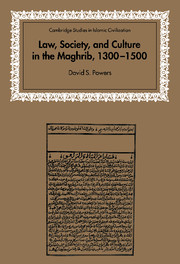Book contents
- Frontmatter
- Contents
- List of figures and tables
- Preface
- Introduction
- 1 Kadijustiz or Qāḍi-Justice? A Paternity Dispute from Fourteenth-Century Morocco
- 2 From Almohadism to Mālikism: The Case of al-Haskūrī, the Mocking Jurist, ca. 712-716/1312–1316
- 3 A Riparian Dispute in the Middle Atlas Mountains, ca. 683-824/1285–1421
- 4 Conflicting Conceptions of Property in Fez, 741–826/1340–1423
- 5 Preserving the Prophet's Honor: Sharīfism, Sufism, and Mālikism in Tlemcen, 843/1439
- 6 On Judicial Style: Two Fatwās on Tawlīj (ca. 880/1475)
- Conclusion: The Muftī
- Bibliography
- Index of Qur'ānic Verses
- Index of Prophetic Ḥadīth
- Index of Names
- Subject index
Conclusion: The Muftī
Published online by Cambridge University Press: 05 July 2014
- Frontmatter
- Contents
- List of figures and tables
- Preface
- Introduction
- 1 Kadijustiz or Qāḍi-Justice? A Paternity Dispute from Fourteenth-Century Morocco
- 2 From Almohadism to Mālikism: The Case of al-Haskūrī, the Mocking Jurist, ca. 712-716/1312–1316
- 3 A Riparian Dispute in the Middle Atlas Mountains, ca. 683-824/1285–1421
- 4 Conflicting Conceptions of Property in Fez, 741–826/1340–1423
- 5 Preserving the Prophet's Honor: Sharīfism, Sufism, and Mālikism in Tlemcen, 843/1439
- 6 On Judicial Style: Two Fatwās on Tawlīj (ca. 880/1475)
- Conclusion: The Muftī
- Bibliography
- Index of Qur'ānic Verses
- Index of Prophetic Ḥadīth
- Index of Names
- Subject index
Summary
The cases analyzed in this book cover a rich variety of legal issues: paternity, fornication, water rights, family endowments, slander of the Prophet, and disinheritance of children. These issues are brought to life by the transcribed documents contained in the fatwās, which give us the names of the persons involved in the cases, as well as the dates and locations of legal events. That one or more of the litigants in each case was a prominent member of his Community perhaps explains the preservation, length and generally high level of legal argumentation of the fatwās. The Marīnid judicial System from 1300 to 1500 CE is brought into focus as we study them.
The Standard mechanism for the resolution of a dispute was a qāḍī judgment issued on the strength of testimonial evidence or a decisory oath, but disputes also were settled through arbitration, and, on occasion, through the direct Intervention of the reigning sulṭān. The apparatus of justice was peopled by the sulṭān himself, qāḍīs, muftīs, Professional witnesses, notaries, experts, and scribes. Arguably the most important actor within the System was the muftī.
Mālikī law was composed of a body of rules and norms that made it possible for Muslims to make sense of the world and to act in it. It was a cultural form that had its own distinctive language, codes, Conventions, presumptions and institutions, its own Special qualities, and its own consequences – in a word, its own legal sensibility.
- Type
- Chapter
- Information
- Law, Society and Culture in the Maghrib, 1300–1500 , pp. 229 - 233Publisher: Cambridge University PressPrint publication year: 2002



